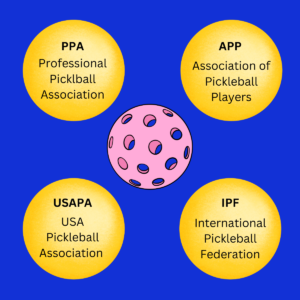
Pickleball has exploded in popularity over the last few years, leading to a surge of organizations dedicated to its promotion, regulation, and development. As the sport continues to evolve, the need for cohesive governing bodies becomes increasingly critical for both recreational and professional play. Below, we explore four prominent organizations: the Professional Pickleball Association (PPA), the Association of Pickleball Players (APP), USA Pickleball Association (USAPA), and the International Pickleball Federation (IPF).
1. Professional Pickleball Association (PPA)
The PPA primarily focuses on professional-level competition and player development. Established to create a structured and high-quality environment for professional pickleball, the PPA organizes tournaments that attract top-tier players and provide significant prize money.
Impact on Pickleball:
- Professionalization of the Sport: By hosting well-organized events and broadcasting matches, the PPA raises the profile of pickleball, attracting fans and sponsors.
- Player Support: The PPA provides resources and support for players, helping them navigate their careers in a rapidly evolving landscape.
2. Association of Pickleball Players (APP)
The APP operates similarly to the PPA but emphasizes inclusivity and accessibility, making competitive pickleball more accessible to a broader audience. It also hosts tournaments, focusing on various skill levels, thus fostering community engagement.
Impact on Pickleball:
- Grassroots Development: By providing a platform for players at all levels, the APP helps grow the sport from the grassroots, ensuring a wider participation base.
- Focus on Player Experience: The APP advocates for player rights and experiences, ensuring that the voices of all players are heard in the organization of tournaments and events.
3. USA Pickleball Association (USAPA)
The USAPA is the national governing body for pickleball in the United States. Its mission includes promoting the sport at all levels, establishing rules, and organizing national championships.
Impact on Pickleball:
- Standardization: The USAPA sets the official rules and regulations for the game, helping to standardize play across various regions and levels.
- Community Engagement: The USAPA focuses on building a strong community through local chapters and events, encouraging participation among recreational players.
4. International Pickleball Federation (IPF)
As the global governing body for pickleball, the IPF promotes the sport internationally and works to standardize rules and regulations worldwide. Its focus is on growing pickleball as a competitive sport on a global scale.
Impact on Pickleball:
- Global Recognition: The IPF helps bring pickleball to international attention, facilitating the establishment of national federations in various countries.
- Unified Standards: By promoting cohesive rules and standards globally, the IPF helps ensure that players have a consistent experience, no matter where they compete.
The Need for Cohesion in Organized Pickleball
As the landscape of organized pickleball changes and grows, the differences between these organizations highlight the complexities of governance in the sport. While each organization plays a vital role, the lack of a unified structure can lead to confusion among players and fans.
Key Considerations:
- Diverse Focus: The PPA and APP prioritize professional play but have different approaches, while the USAPA focuses on grassroots development and standardization.
- Global Coordination: The IPF plays a critical role in connecting national bodies and establishing a unified international framework.
Conclusion
The future of pickleball is bright, but it necessitates a collaborative effort among these organizations. As recreational and professional play continues to grow, a cohesive approach will be essential for maintaining the integrity of the sport and ensuring a positive experience for all players. The rapid evolution of organized pickleball presents both challenges and opportunities, making effective governance more crucial than ever.
